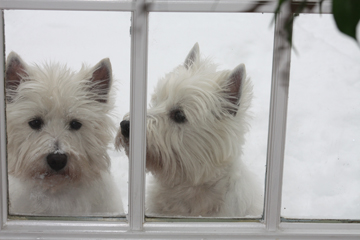We can all benefit from the helpful advice and services (big and small) of good people doing great work. We will be using our blog to highlight different organizations and share the insight of people doing just that.
Since the recent “polar vortex” disrupted the DC area, we wanted to remind everyone not to forget about their furry little friends. Following are some helpful tips and guidelines from the Humane Society (www.humanesociety.org) to keep your pets safe and healthy during the cold winter days.

1. Keep pets indoors and warm
Don’t leave dogs or cats outdoors when the temperature drops. Regardless of the season, short-haired, very young, or old dogs and all cats should never be left outside without supervision. Dogs and cats are safer indoors, except when taken out for exercise. During walks, short-haired dogs may feel more comfortable wearing a sweater. No matter what the temperature is, wind chill can threaten a pet’s life. Pets are sensitive to severe cold and are at risk for frostbite and hypothermia when they are outdoors during extreme cold snaps. Exposed skin on noses, ears, and paw pads can quickly freeze and suffer permanent damage.
2. Give your pets plenty of water
Pets who spend a lot of time outdoors need more food in the winter because keeping warm depletes energy. Routinely check your pet’s water dish to make certain the water is fresh and unfrozen. Use plastic food and water bowls rather than metal; when the temperature is low, your pet’s tongue can stick and freeze to metal.
3. Help neighborhood outdoor cats
If there are outdoor cats, either owned pets or community cats (ferals, who are scared of people, and strays, who are lost or abandoned pets) in your area, remember that they need protection from the elements as well as food and water. It’s easy to give them a hand.
Do you have any other helpful advice for when the weather strikes?
We would love to hear stories of how you and your pets fared in the recent snowfall.


